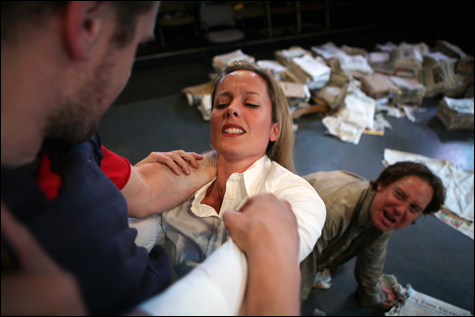
THE WIDOW’S BLIND DATE: The recipe for violence starts cooking early. |
Lillian Hellman turned the pot down from boil to simmer for THE AUTUMN GARDEN, her 1951 attempt to be Chekhovian. Actually, since the play is set in a Gulf Coast “summer guest hotel” about 100 miles from New Orleans, it feels as if Hellman had stuffed Chekhov, Tennessee Williams, and Horton Foote into a bag and shaken it. Devoid of the life-destroying lesbian accusations of The Children’s Hour or the blunt-instrumental Southern family feuding of The Little Foxes, this lively yet discursive examination of disappointed lives is tartly witty yet infused with a shrewd, sad gentility. And though Hellman penned it at 45, it’s as autumnal as the hearty flowerbeds of the title, its denizens past their summer bloom but not dead yet.
Hellman considered The Autumn Garden the best of her plays. So did companion Dashiell Hammett, who not only inspired a couple of the characters but also supplied rewrites. As if to strengthen their assessment, the work is receiving a very satisfying revival by Williamstown Theatre Festival (through August 26). The festival is known for its lavish revisitation of classics, American and otherwise — but given the hectic summer schedule and limited rehearsal time, the name actors you eagerly drove west to see sometimes appear to be acting in different plays. Not this time. The Autumn Garden is fully congealed, like a big Southern-Sunday-supper Jell-O mold, with Allison Janney, Elizabeth Franz, John Benjamin Hickey, Jessica Hecht, Maryann Plunkett, and Mamie Gummer suspended in it like fruit. It’s not ambrosia — as Hellman told the play’s original director, Harold Clurman, “Chekhov’s a much better writer than I am.” But it will do nicely.

It’s set toward the end of the summer of ’49 in the Tuckerman manse; now a seasonal hotel, the place exudes a gossamer, worn-out grandeur. Tonight, however, it’s abuzz with expectation of the arrival of artist Nick Denery, proprietor Constance Tuckerman’s erstwhile fiancé, who 20 years ago decamped for Paris to study painting and met a rich New York woman on the boat, leaving Constance to carry a torch. Also on hand are old acquaintances Ned Crossman, who used to love Constance but now has eyes only for the bottle, and Carrie Ellis, who is vacationing in the company of her wealthy, sharp-tongued mother-in-law and her effeminate son, Frederick. The party is rounded out by General Benjamin Griggs, a veteran of two world wars, and his silly wife, Rose, as well as Constance’s French-born niece, Sophie, who was rescued from post-war poverty and is unenthusiastically engaged to Frederick. Enter the Denerys — appealing if spoiled Nick and his chic, sorrowful shadow of a wife, Nina — to stir the pot. But what’s roiling around in there, apart from a scandal shamefully puny by today’s standards, is the somber realization — voiced by General Griggs in a speech knocked out by Hammett after Hellman had had many an unsuccessful go — that there is no moment at which you can just erase your life in order to turn it around. What’s done is done, even if what’s done is you.
The play is more character-driven and reflective than Hellman’s other work for the stage; it’s like an apolitical premonition of the success the author would enjoy as an imaginative if not outright mendacious memoirist, creator of shrines to her own political integrity and her liaison with Hammett. Its characters tend toward stereotype, but British directors sometimes have a way with our Southern writers, and under David Jones’s guidance, Hellman’s flawed lot of balked souls come alive, touching the heart as well as making you want to slap them. Hickey has the toughest job, making sympathetic the careless, sometimes consciously cruel artist manqué Nick, who churns up old losses either without meaning to or as something to do. The Dick Cavett–esque Hickey captures the obtuse boyishness in Nick, scampering about in a bowlegged stoop, trying to get someone, anyone, to come out and play. And Hecht brings an exotic, gracious sadness to his outsider wife, who has been dragged into this play too many times before.
The most delicious performance is by the incomparable Franz, who won a Tony as the grittiest Linda Loman in memory. As the acerb, older Mrs. Ellis, she has all the funniest lines, the best of which are priceless. As the candid Constance, Janney marries harshness to vulnerability, no mean feat. Rufus Collins nicely underplays the alcoholic Ned, for whom there is no longer any hangover of self-deception. Maryann Plunkett, as a blond-frizzled Rose Griggs, whose husband wants to divorce her, is vapid, to be sure, but not without dignity. As for Mamie Gummer, acting is mother’s milk to her — mother being Meryl Streep. Not only does Gummer dare to take on a role that requires an accent and dispatch it naturally; she also makes the dependent Sophie accommodating but tough, sometimes in the course of a single, suddenly shutdown gesture. If we must have a thespian dynasty, this beats hell out of Kate Hudson.